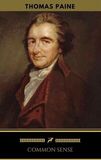

Common Sense (Golden Deer Classics)
Nr. pagini: 59
Enormously popular and widely read pamphlet, first published in January of 1776, clearly and persuasively argues for American separation from Great Britain and paves the way for the Declaration of Independence. This highly influential landmark document attacks the monarchy, cites the evils of government and combines idealism with practical economic concerns.Thomas Paine (February 9, 1737 – June 8, 1809) was an English-American political activist, philosopher, political theorist, and revolutionary. One of the Founding Fathers of the United States, he authored the two most influential pamphlets at the start of the American Revolution, and he inspired the rebels in 1776 to declare independence from Britain. His ideas reflected Enlightenment-era rhetoric of transnational human rights. He has been called "a corsetmaker by trade, a journalist by profession, and a propagandist by inclination."
Born in Thetford in the English county of Norfolk, Paine migrated to the British American colonies in 1774 with the help of Benjamin Franklin, arriving just in time to participate in the American Revolution. Virtually every rebel read (or listened to a reading of) his powerful pamphlet Common Sense (1776), proportionally the all-time best-selling American title, which crystallized the rebellious demand for independence from Great Britain. His The American Crisis (1776–83) was a pro-revolutionary pamphlet series. Common Sense was so influential that John Adams said, "Without the pen of the author of Common Sense, the sword of Washington would have been raised in vain."
Paine lived in France for most of the 1790s, becoming deeply involved in the French Revolution. He wrote Rights of Man (1791), in part a defense of the French Revolution against its critics. His attacks on Anglo-Irish conservative writer Edmund Burke led to a trial and conviction in absentia in 1792 for the crime of seditious libel. In 1792, despite not being able to speak French, he was elected to the French National Convention. The Girondists regarded him as an ally. Consequently, the Montagnards, especially Robespierre, regarded him as an enemy.
In December 1793, he was arrested and was taken to Luxembourg Prison in Paris. While in prison, he continued to work on The Age of Reason (1793–94). Future President James Monroe used his diplomatic connections to get Paine released in November 1794.[citation needed] He became notorious because of his pamphlets The Age of Reason, in which he advocated deism, promoted reason and free thought, and argued against institutionalized religion in general and Christian doctrine in particular. He also published the pamphlet Agrarian Justice (1797), discussing the origins of property, and introduced the concept of a guaranteed minimum income. In 1802, he returned to the U.S. where he died on June 8, 1809. Only six people attended his funeral as he had been ostracized for his ridicule of Christianity.
Publicat de: Oregan Publishing
Titluri Similare
Vezi toateCum funcționează?
Iți creezi cont.
Creează-ți un cont gratuit chiar aici.
Descarci aplicația Voxa
Disponibilă pentru Android și iPhone de pe Google Play sau App Store.
Încerci gratuit zile
Ai acces nelimitat la toate titlurile și întreaga experiență Voxa.
Asculți fără internet
Descarcă audiobook-urile preferate și bucură-te de ele chiar și când nu ai conexiune la internet.
















